|
 Just over two hundred years ago, in the warm summer of 1798, the
people of Ireland, inspired by the ideals and successes of the French and
American Revolutions, rose in armed revolt against the tyranny of an alien
government. Poorly equipped with only pitchforks, pikes, and a handful of
firearms, they confronted the well-organised might of the British Empire in an
epic struggle which ultimately failed, but which served to inspire later
generations of Irish men and women to fight for and win the liberty and
independence for which so many had given their lives over seven long centuries. Just over two hundred years ago, in the warm summer of 1798, the
people of Ireland, inspired by the ideals and successes of the French and
American Revolutions, rose in armed revolt against the tyranny of an alien
government. Poorly equipped with only pitchforks, pikes, and a handful of
firearms, they confronted the well-organised might of the British Empire in an
epic struggle which ultimately failed, but which served to inspire later
generations of Irish men and women to fight for and win the liberty and
independence for which so many had given their lives over seven long centuries.
 The United Irish Rebellion began at the tiny village of
Boolavogue, in County Wexford, on May 26th, 1798, where the insurgents were led by the legendary Father John
Murphy, who told his followers: "It is better to die like fighting men than to be shot down like dogs in the ditches".
The first rebel victory came on the following day, Whit Sunday, May 27th, when a large gathering of insurgents on
Oulart Hill
overwhelmed a detachment of the much-feared and hated North Cork Militia. Despite this and many other gallant successes, the Rising ultimately failed,
yet it served to inspire later generations to continue to strive for the freedom which these men dreamed of.
The United Irish Rebellion began at the tiny village of
Boolavogue, in County Wexford, on May 26th, 1798, where the insurgents were led by the legendary Father John
Murphy, who told his followers: "It is better to die like fighting men than to be shot down like dogs in the ditches".
The first rebel victory came on the following day, Whit Sunday, May 27th, when a large gathering of insurgents on
Oulart Hill
overwhelmed a detachment of the much-feared and hated North Cork Militia. Despite this and many other gallant successes, the Rising ultimately failed,
yet it served to inspire later generations to continue to strive for the freedom which these men dreamed of.
 The final battle was fought
by a much-exhausted remnant of a Wexford column which had set out some weeks before on what was to become known as the "long march",
in an effort to join up with
their counterparts to the north. Their final courageous and valiant stand was made at Drishogue Lane,
in north County Dublin, near the small
town of Ballyboughal, within whose ancient churchyard still lie the remains of those brave men. A plaque
to their memory was unveiled
there on July 14th, 1998, to mark the bicentenary of their ultimate sacrifice for the country they loved so well. The final battle was fought
by a much-exhausted remnant of a Wexford column which had set out some weeks before on what was to become known as the "long march",
in an effort to join up with
their counterparts to the north. Their final courageous and valiant stand was made at Drishogue Lane,
in north County Dublin, near the small
town of Ballyboughal, within whose ancient churchyard still lie the remains of those brave men. A plaque
to their memory was unveiled
there on July 14th, 1998, to mark the bicentenary of their ultimate sacrifice for the country they loved so well.
 More than thirty thousand died in that long hot summer of bloodshed and bravery. These
were not trained soldiers, but ordinary men and women the same as you and I; farm
workers, tradesmen, teachers and the like, yet they considered their cause
noble enough to justify the risk to their own lives and those of their
relatives. Many of the dead were peasants who charged cannons armed with pitchforks or crude pikes,
and a significant number of them were women.
The fact that so many took the field so poorly armed, and with such little hope of ultimate success, is another indication of just how far down
the road to total despair England's corrupt colonial rule had driven the impoverished masses of Ireland. The rebellion was put down with
as much violence as the British Empire could muster. Many who tried to surrender were killed on the field and many more were executed afterwards.
When the Rebellion was finally over, the British government forced an Act of Union on the Irish people that would prove to be another sad
and tragic episode in the legacy
of England's misrule of its closest neighbour.
More than thirty thousand died in that long hot summer of bloodshed and bravery. These
were not trained soldiers, but ordinary men and women the same as you and I; farm
workers, tradesmen, teachers and the like, yet they considered their cause
noble enough to justify the risk to their own lives and those of their
relatives. Many of the dead were peasants who charged cannons armed with pitchforks or crude pikes,
and a significant number of them were women.
The fact that so many took the field so poorly armed, and with such little hope of ultimate success, is another indication of just how far down
the road to total despair England's corrupt colonial rule had driven the impoverished masses of Ireland. The rebellion was put down with
as much violence as the British Empire could muster. Many who tried to surrender were killed on the field and many more were executed afterwards.
When the Rebellion was finally over, the British government forced an Act of Union on the Irish people that would prove to be another sad
and tragic episode in the legacy
of England's misrule of its closest neighbour.
 We remember
our valiant dead of 1798 with pride, for they gave all they had and did not count the cost. We remember
our valiant dead of 1798 with pride, for they gave all they had and did not count the cost.
"They rose in dark and evil days
To right their native land;
They kindled here a living blaze
That nothing shall withstand.
Alas! that Might can vanquish Right
-- They fell and passed away;
But true men, like you, men,
Are plenty here today."

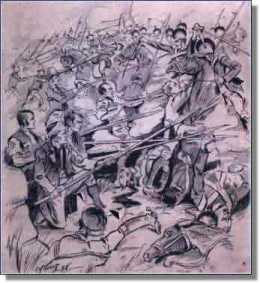
 The favoured weapon of the insurgents was the pike, a weapon well-suited to mass insurrection.
It was effective, cheap,
easy to manufacture, simple to disguise by separating the head from the shaft, and its use could be quickly learned.
The pike was an excellent thrusting weapon, capable of breaking cavalry charges, with the pikemen formed firmly shoulder-to-shoulder
in close set but deep files. The experienced French soldier, Miles Byrne, praised "the great power of the
pike as a war weapon, especially at close quarters." Jonah Barrington declared it to be "irresistible in close combat,
even against infantry." The favoured weapon of the insurgents was the pike, a weapon well-suited to mass insurrection.
It was effective, cheap,
easy to manufacture, simple to disguise by separating the head from the shaft, and its use could be quickly learned.
The pike was an excellent thrusting weapon, capable of breaking cavalry charges, with the pikemen formed firmly shoulder-to-shoulder
in close set but deep files. The experienced French soldier, Miles Byrne, praised "the great power of the
pike as a war weapon, especially at close quarters." Jonah Barrington declared it to be "irresistible in close combat,
even against infantry."
 The 1798 pike consisted of a plain iron head mounted on a wooden shaft, usually of ash, because of
its straight growth. Occasionally, a hooked projection was added at right angles below the base of the head, which
allowed bridles to be slashed, and a backwards cut to be inflicted on the rider. The "halberd" style axe-blade was
not used in 1798, but was widely available some fifty years later. The effective use of the pike required courage,
discipline and skill in tight formations. Its use terrified opponents who had no experience of what they termed
"these terrible weapons". The pike staff, between eight and twelve feet in length, was grounded against the right foot,
with the point inclined upwards at an angle, while the pikeman retained a firm grip on the shaft to face a charge
of mounted cavalry. The 1798 pike consisted of a plain iron head mounted on a wooden shaft, usually of ash, because of
its straight growth. Occasionally, a hooked projection was added at right angles below the base of the head, which
allowed bridles to be slashed, and a backwards cut to be inflicted on the rider. The "halberd" style axe-blade was
not used in 1798, but was widely available some fifty years later. The effective use of the pike required courage,
discipline and skill in tight formations. Its use terrified opponents who had no experience of what they termed
"these terrible weapons". The pike staff, between eight and twelve feet in length, was grounded against the right foot,
with the point inclined upwards at an angle, while the pikeman retained a firm grip on the shaft to face a charge
of mounted cavalry.

 The following is a poem entitled simply "1798", composed and read by Anthony Cronin, of Enniscorthy, County Wexford, at the site of the
insurgents' camp on Vinegar Hill, on June 21st, 1998, two centuries after the battle which was fought there. I had the privilege to be present
on that occasion, and to stand on the very spot where so much selflessness and courage had been displayed by my countrymen and women on that
glorious day two hundred long years ago. I respectfully re-dedicate Mr. Cronin's composition to those Irish men and women, of all religious and
cultural backgrounds, who gave
their lives for the sake of Ireland's freedom. The following is a poem entitled simply "1798", composed and read by Anthony Cronin, of Enniscorthy, County Wexford, at the site of the
insurgents' camp on Vinegar Hill, on June 21st, 1998, two centuries after the battle which was fought there. I had the privilege to be present
on that occasion, and to stand on the very spot where so much selflessness and courage had been displayed by my countrymen and women on that
glorious day two hundred long years ago. I respectfully re-dedicate Mr. Cronin's composition to those Irish men and women, of all religious and
cultural backgrounds, who gave
their lives for the sake of Ireland's freedom.
"Ar dheis Dé go raibh a n-anamacha"
(May their souls be on the right hand of God.)
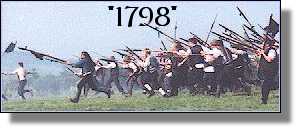
They wore their Sunday best for early battle,
Coming with ribbons in their hats to join
Their neighbours at the crossroads by the chapel
As on a holy day of obligation.
War is release and sudden holiday,
For some, release now from a nightly horror;
The flaming thatch, the mingled oaths and screams.

The lovely summer weather gave them leave
To sleep beneath the bright and beckoning stars,
And wake each day to Liberty's wide dawn.
But nothing happens as a wish would have it;
And war is chance; its currents rip us far
Beyond all headlands and all reach of rescue,
Beyond what heart can hope or soul can stomach.

Too soon the Slaney's waves were stained.
The Barrow
carried its cargo seawards from New Ross
To cold, wide waters where no sail appeared.
Their columns heaving now with frantic households,
Not heroes, merely people; but the pikes
Their hedge and shelter in the broken weather.
Here on this hill they stood, where we assemble;
A civic gathering in a different time.

History, the nightmare from which all mankind
Must struggle to awake, recedes at last;
And our normality accommodates
The dream of Liberty, Equality,
For which they had to rend the normal day
To take the lives of others, to give their own;
What seemed so distant then, to us mundane.
We should recall the price they had to pay.

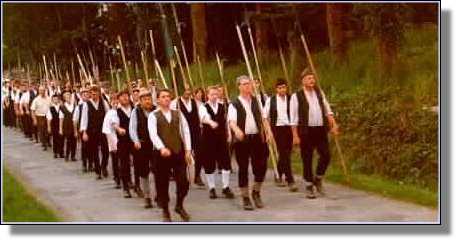
"From the wild burst with which ye triumphed at Oulart Hill down to the faint gasp wherewith
the last of your
column died in the cornfields of Meath, there is nothing to shame your
valour, your faith or your patriotism."
(Thomas Davis, on the Wexford rebels...)

"I understand you are inclined to hold the Insurrection cheap.
Rely upon it; there never was in any country so formidable
an effort
on the part of the people..."
(Lord Castlereagh, to an English friend, following the end of the United Irish Rebellion.)


|
![]()

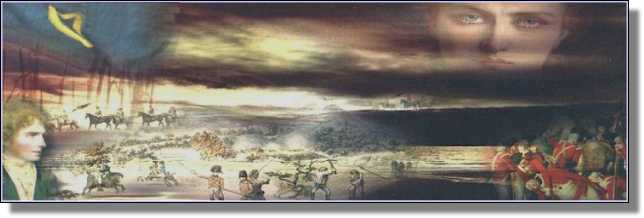

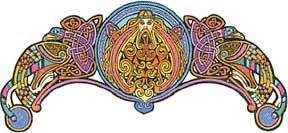
![]()